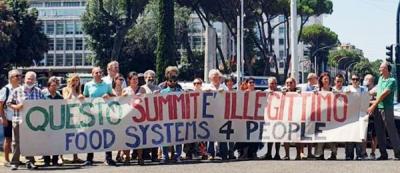NGOs criticise 'corporate-driven' UN Food Summit in Rome

ROME - - Non-Governmental Organisations (NGOs), such as Food Systems 4 People, have condemned the United Nations Food Systems Summit which is taking place from Monday to Wednesday.
Regarding the United Nations event, the largest global food justice movements, small-scale food producer organisations and Indigenous Peoples have released a new statement denouncing the United Nations’ controversial approach to tackling hunger and malnutrition. These groups comprise millions of people across the world.
In a press conference on July 17, representatives from the People’s Autonomous Response to the Summit, part of the Food Systems 4 People movement, highlighted the urgent, coordinated actions that are needed to overcome the global hunger crises. They also outlined the necessity for the UN to respond to the rights and demands of those most affected by the hunger, climate and health crises.
“The UN Food Systems Summit has not only overlooked our rights and the structural causes of the crises,” remarks Saúl Vicente from the International Indian Treaty Council, “ […] The intention of the Summit organisers is to sell us the corporate and industrial project as transformation.”
The movements and organisations opposing the summit call for an urgent shift away from corporate-driven industrial models. Instead, they want to see measures towards biodiverse, agroecological, community-led food systems that prioritise the public interest over profit-making.
The discontent for the summit is also echoed by the non-profit website Common Dreams which argues that the summit should be an opportunity to address structural inequalities and tackle hunger.
It proffers that the event “should be a chance to learn from small-scale producers whose sustainable food practices feed 70% of the world. Instead, [the] conference will be a festival of greenwashing, allowing Big Agriculture corporations to tighten their grip on food systems.”
Common Dreams asserts that the UN’s Food and Agriculture Organisation receives less than a third of its $3.25bn budget from the world’s governments and is therefore dependent on “voluntary contributions” - including from corporations and their proxies - for the remainder.
Both organisations, and many others, believe that we are facing a choice between corporate-controlled food systems and locally-sourced food. They feel it is necessary to “prioritise the needs and rights of those most affected by the hunger, climate and health crises.”
Common Dreams concludes that the summit should abandon unsustainable, exploitative food systems and instead encourage the world to orient itself towards more diverse and ecological methods of food production.
es
© COPYRIGHT ITALIAN INSIDER
UNAUTHORISED REPRODUCTION FORBIDDEN


